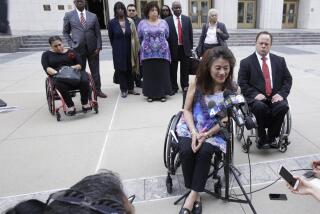Washington Thrift Settles Redlining Case : Law: Chevy Chase Federal to pay $11 million, but it denies it withheld services in black areas. Action may set precedent.
- Share via
WASHINGTON — In an action that prosecutors said could set a national precedent, the Justice Department obtained a court settlement Monday against a major thrift that allegedly refused to offer its services in predominantly black neighborhoods.
The action against Chevy Chase Federal Savings Bank marks the first time the government has charged a lending institution with discriminating against an entire community because of racial composition.
Disclosing that similar cases are under way across the country, Atty. Gen. Janet Reno said: “We’re not asking banks to make bad loans. We’re simply asking them to abandon bad policies.”
Chevy Chase Federal agreed to pay $11 million to settle the department’s allegations that it violated the federal Fair Housing Act and the Equal Credit Opportunity Act by declaring black areas off-limits for mortgage lending, a practice known as “redlining.”
However, bank officials denied in a statement that they had red-lined neighborhoods, claiming that they had sought to serve everyone in the Washington area. They said they settled the federal lawsuit only to avoid a long and costly legal struggle.
The settlement is unique because previous anti-discrimination efforts by the Justice Department have targeted banks and savings and loans that redlined individual loan applicants. The Chevy Chase action charged that the bank blocked out entire neighborhoods in which it refused to market its services.
“To shun an entire community because of its racial makeup is just as wrong as to reject (applicants) because they are African American,” Reno said.
Under the first-of-its-kind settlement, the bank’s $11 million will be used to establish a special below-market loan program for residents in areas that were allegedly redlined and to open branches and mortgage offices in those neighborhoods, federal officials said.
“This money will not go into the U.S. Treasury,” said Eric H. Holder Jr., the U.S. attorney for the District of Columbia. “It will be used to finance homes for people living in neighborhoods that were victimized.”
The agreement was filed in court and approved by U.S. District Judge Stanley Harris.
Before the settlement, Chevy Chase--the largest thrift in the Washington area--operated all of its 78 branches and 20 mortgage offices in predominantly white neighborhoods, U.S. officials said. They said the bank underwrote about 97% of its loans from 1976 to 1992 in majority white areas.
Justice Department lawyers said that since the thrift was told of the federal investigation 14 months ago--an inquiry instigated by a series of articles in the Washington Post--the institution began aggressive but belated actions to serve some black neighborhoods.
Signaling the precedent-setting nature of the settlement, Reno told a news briefing: “Banks must serve the needs of all residents in the community, not just those who are rich or white. That’s the law.”
She said bankers throughout the nation should not assume “that just because an area is predominantly African American that it’s economically risky. That’s just not so. It’s important for bankers to look at their practices in terms of building business.”
More to Read
Sign up for Essential California
The most important California stories and recommendations in your inbox every morning.
You may occasionally receive promotional content from the Los Angeles Times.













